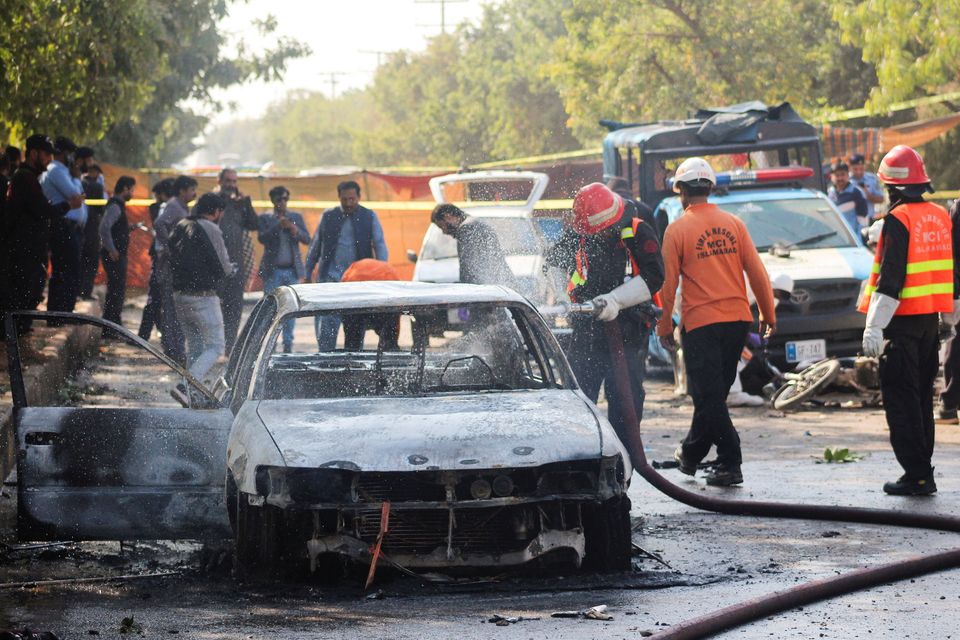World
Suicide Bomber Strikes Court in Islamabad, Killing 12

A suicide bomber detonated explosives outside a courthouse in Islamabad on March 18, 2024, resulting in the deaths of at least 12 people and injuring 27 others. This incident marks a significant escalation of violence in Pakistan, prompting the country’s defence minister, Khawaja Muhammad Asif, to declare a “state of war.” The attack occurred during lunchtime, as the bomber targeted civilians and police officers near the entrance of the court.
In the aftermath of the bombing, Pakistani officials have pointed fingers at Afghanistan, alleging that the Taliban government harbors militants responsible for the attack. Kabul has firmly denied these accusations, stating that it does not allow its territory to be used for attacks on neighboring countries. Defence minister Asif stated, “Bringing this war to Islamabad is a message from Kabul, to which Pakistan has the full power to respond.”
Pakistan’s Escalating Tensions with Neighbors
The attack is part of a troubling trend of violence that has intensified in recent months. Following a four-day conflict with India in May, Pakistan has conducted airstrikes in Afghanistan, targeting areas believed to harbor Pakistani militants. As tensions rise, officials have expressed concerns about the potential for further retaliation. Interior minister Mohsin Naqvi emphasized the urgency of the situation, stating that if Afghanistan fails to curb these militants, Pakistan will take necessary action.
While the Pakistani Taliban, known as the Tehreek-e-Taliban Pakistan (TTP), has denied any involvement in the bombing, the group has previously focused its attacks primarily on security forces rather than civilians. The last major attack on civilians in Islamabad occurred over a decade ago, highlighting the severity of this incident. Naqvi noted that the bomber had attempted to enter the courthouse but detonated the explosive outside after being unable to find a way in.
This attack follows another violent incident in India, where an explosion resulted in the deaths of eight people just one day prior. Observers have pointed out that both attacks seem aimed at instilling fear within communities. Retired General Mohammad Saeed stated, “These targets are clearly an attempt to spread panic in society.”
Implications and Future Concerns
Analysts warn that the emergence of new militant factions may complicate the situation further. Abdul Basit, a senior associate fellow at the S. Rajaratnam School of International Studies, noted, “They are sending a signal: if there will be strikes in Kabul, Islamabad will not be safe.” This change in tactics could lead to an increase in indiscriminate violence, posing significant challenges for security forces in both countries.
As investigations continue into the court bombing, officials are examining the connections between the attackers and their alleged handlers in Afghanistan. Naqvi indicated that contacts were made during the attack, suggesting a coordinated effort. The implications of these events extend beyond immediate security concerns, potentially affecting diplomatic relations in the region.
Both governments face a complex landscape as they navigate the repercussions of rising violence. While the Taliban in Kabul expressed sorrow over the attacks, the lack of a clear response to Pakistan’s accusations raises questions about regional stability. The situation remains fluid, and further developments are likely as authorities seek to address the challenges posed by militant groups operating across borders.
-

 Top Stories3 months ago
Top Stories3 months agoTributes Surge for 9-Year-Old Leon Briody After Cancer Battle
-

 Entertainment4 months ago
Entertainment4 months agoAimee Osbourne Joins Family for Emotional Tribute to Ozzy
-

 Politics4 months ago
Politics4 months agoDanny Healy-Rae Considers Complaint After Altercation with Garda
-

 Top Stories4 months ago
Top Stories4 months agoIreland Enjoys Summer Heat as Hurricane Erin Approaches Atlantic
-

 World5 months ago
World5 months agoHawaii Commemorates 80 Years Since Hiroshima Bombing with Ceremony
-

 Top Stories3 months ago
Top Stories3 months agoNewcastle West Woman Patricia Foley Found Safe After Urgent Search
-

 Top Stories5 months ago
Top Stories5 months agoFianna Fáil TDs Urgently Consider Maire Geoghegan-Quinn for Presidency
-

 World5 months ago
World5 months agoCouple Convicted of Murdering Two-Year-Old Grandson in Wales
-

 World5 months ago
World5 months agoGaza Aid Distribution Tragedy: 20 Killed Amid Ongoing Violence
-

 World5 months ago
World5 months agoAristocrat Constance Marten and Partner Convicted of Infant Murder
-

 Top Stories4 months ago
Top Stories4 months agoClimbing Errigal: A Must-Do Summer Adventure in Donegal
-

 Top Stories4 months ago
Top Stories4 months agoHike Donegal’s Errigal Mountain NOW for Unforgettable Summer Views








